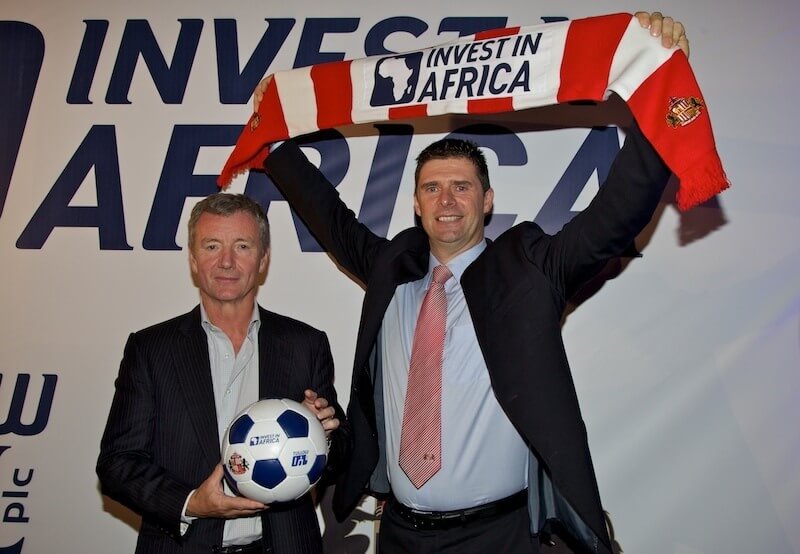 At Platform we’ve been very focused on looking at how oil companies use cultural institutions to plaster over their controversial operations, but just yesterday a UK-based oil company moved into the sports sector. The Guardian reported that Premier League Sunderland AFC had secured “pioneering African sponsorship” with Invest in Africa.
At Platform we’ve been very focused on looking at how oil companies use cultural institutions to plaster over their controversial operations, but just yesterday a UK-based oil company moved into the sports sector. The Guardian reported that Premier League Sunderland AFC had secured “pioneering African sponsorship” with Invest in Africa.
The article makes Invest In Africa sound like some sort of benevolent development NGO, emphasising the outfit’s “not for profit” credentials, and uncritically reporting that its mission is “to challenge the perception of the continent as crisis-torn and poverty-stricken and persuade British companies to begin operations there.” Three years ago, Barcelona won praise for putting UNICEF on their shirts – this is an attempt to get similar credit, while effectively just getting money from an oil company aggressively expanding its operations across the continent.
The article acknowledges that Tullow Oil is the founding partner of Invest In Africa, but when you look at the website and you can’t see any other partners apart from Tullow Oil, it leads you to question if this is simply a front outfit for the company. Creating an organisation like this allows it to frame its drilling operations in the rhetoric of “growth and development on the African continent” – precisely the line enthusiastically parroted by Sunderland manager Martin O’Neill.
This blurred line between Tullow Oil and Invest In Africa is made even more suspect when you place their logos side by side (as below) and see the similarities in font, design and colour. ‘Criticise Tullow and you’re against development’, runs the corporation’s semiotic logic. But the development PR of Tullow is enormously undermined by the nature of the deals that they have tried to strike in countries like Uganda and the Democratic Republic of Congo.
 In May 2010, we released a report that analysed leaked contracts and showed that Tullow (and Heritage Oil) and the British Embassy in Kinshasa had been lobbying for terms that would cut Congolese government revenues by over $10 billion – a figure equivalent to the country’s entire national debt. There was also a credible report in a US diplomatic cable that Tullow’s then partner in Congo, Heritage Oil, was tasked with building relationships with senior politicians to ensure the lucrative deal went through.
In May 2010, we released a report that analysed leaked contracts and showed that Tullow (and Heritage Oil) and the British Embassy in Kinshasa had been lobbying for terms that would cut Congolese government revenues by over $10 billion – a figure equivalent to the country’s entire national debt. There was also a credible report in a US diplomatic cable that Tullow’s then partner in Congo, Heritage Oil, was tasked with building relationships with senior politicians to ensure the lucrative deal went through.
The result of this particular “Investment in Africa” would have represented a significant transfer of wealth from some of Africa’s poorest to British and Irish investors. Elsewhere, from Ghana to Kenya, Tullow have worked against development outcomes by resisting calls for their 25-year contracts to be made public.
Last month Tullow were on the backfoot again after a Corporate Watch investigation found that the killing of six Congolese by the Ugandan army next to a shared Tullow/Heritage exploration block was triggered by Heritage straying across the border illegally. Only following the release of the report – a full five years since the deaths – has Tullow promised to investigate what really happened.
Yesterday’s announcement, on the other hand, asserted that people across Africa should be grateful not only for the promotion of Western extractive interests, but also for their exposure to Sunderland AFC. Aidan Heavey, chief executive of Tullow Oil said:
There’s a huge, growing population – the biggest young population on the planet is in Africa, and they are football-mad. Sunderland will become the Premier League club in Africa. Everybody will be wearing the Sunderland shirt, every kid in every school will want a Sunderland shirt which says ‘Invest in Africa’, believe me. It will be the number one club, so what you are looking at is a huge market and huge exposure, and Sunderland will have that exposure.
Perhaps English Premier League football and oil interests are the perfect fit, after all. Both industries are devoted to aggressive marketing and revenue maximisation from a global product, with no regard for local communities. The ‘EPL’ in Africa is killing attendances in domestic leagues. It’s often tied up with promotion of small-bet gambling in the cities. Compare that to an older working-class fan culture on the continent that revolved around going to local games, an experience that often used to prove politicising. The ‘Express’ team in Uganda (where Tullow are hoping to start production this year) were the influential team of the Baganda. Now the crowds are in the hundreds. The political elite is certainly grateful that fans prefer sitting in bars watching the Manchester derby to hitting the streets after a live match.
This blog post was co-written with Taimour Lay who used to investigate Tullow for Platform in East Africa